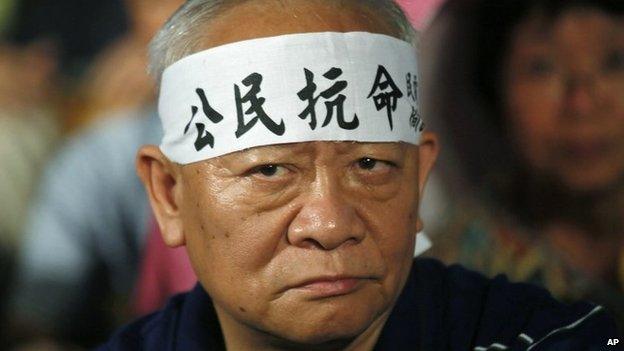China media: Beijing's Hong Kong ruling
- Published

Pro-democracy activists are angry over Beijing's ruling
Papers in China urge Hong Kong to accept Beijing's guidelines over electoral reforms in the territory.
China's legislature on Sunday ruled that candidates standing for Hong Kong's election must be approved by more than half of a special nominating body.
The election, due in 2017, will be the first in which the Hong Kong chief executive is directly elected by voters.
The ruling also set out the framework for the formation of the special nominating body. It said this would be "in accordance with" the existing 1,200-strong Election Committee - a body widely seen as dominated by pro-Beijing groups.
Democratic groups in Hong Kong have vowed to fight the ruling, saying it gives Beijing an effective veto over candidates for Hong Kong's next leader.
Most papers in China have given front-page coverage, external to the news, stating that "Hong Kong is able to hold elections from 2017". However, the papers make no mention of the unhappiness among pro-democracy groups in Hong Kong.
State-run Xinhua News Agency, external hails the decision as "a historical moment in Hong Kong's democratic development", pointing out that the "implementation of the universal suffrage" is a "solemn promise from the central government to all the people in Hong Kong".
The article warns that if there are political forces and factions in the society that "do not respect the central government's right to decide on Hong Kong's political system development... the stability and prosperity of Hong Kong will be immensely affected".
"Hong Kong is China's Hong Kong. The Chinese government's right for total governance is irreversible… The central government's position is determined and clear. It will not step back nor compromise," states the article.
'Hacking public opinion'
Echoing similar views, the People's Daily editorial, external, which has been widely reprinted in several papers, adds that the decision "is a critical development in Hong Kong's political system".
It criticises "some people" in Hong Kong for "hacking public opinion" and "hurting Hong Kong's rule of law and social order".
"The person who confronts the central government will not be permitted to become the chief executive… Adhering to this bottom line will not only benefit the country's security and interest, but it will also protect the benefits of all people and investors in Hong Kong," it says.
Responding to criticism that the electoral system falls short of "international standards", the China Daily, external points out that a premature introduction of Western-style democracy into many countries has never yielded the intended results.
"The sensible approach should be to advance democracy in a gradual and orderly manner as advised by the central government. Basic democratic rights and much less universal suffrage had been glaringly absent in the city's 150 years of colonial rule," reminds the daily.
Progress or standstill?
Meanwhile, views are more varied in Hong Kong media outlets over Beijing's decision.
Democratic groups have described Sunday as "the darkest day in Hong Kong's democracy".
Some commentaries and editorials, external express discontent, while others discuss whether the territory should "pocket the decision first" (accept the ruling first and refine it in future).
"Many people in Hong Kong have all along known that the Chinese communist party is not trustworthy, yet when the decision was made, the Hong Kongers who had believed in democracy and fought for universal suffrage are still experiencing the anger, disappointment and heartache," says an article in the Apple Daily, external.
The paper also criticises Hong Kong's representatives in Beijing for "betraying" the territory.
Expressing disappointment, the Ming Pao daily, external foresees political and social instability.
"No matter how the situation develops, we only hope that the pan-democrats will insist on using non-violent methods to fight for democracy and draw a line from the radical forces to prevent Hong Kong from descending into chaos," it urges.
Reflecting on the "pocket-the-decision-first" perspective, the South China Morning Post, external suggests the city could adopt the "imperfect model" and "strive for further improvements" in the future.
"Imperfect as it is, the model is still a step forward… The public can still voice their opinion in the second-stage consultation. Their views will have an impact on lawmakers' voting decision. On the road to democracy, progress is always preferable to a standstill," it says.
BBC Monitoring, external reports and analyses news from TV, radio, web and print media around the world. For more reports from BBC Monitoring, click here. You can follow BBC Monitoring on Twitter, external and Facebook, external.